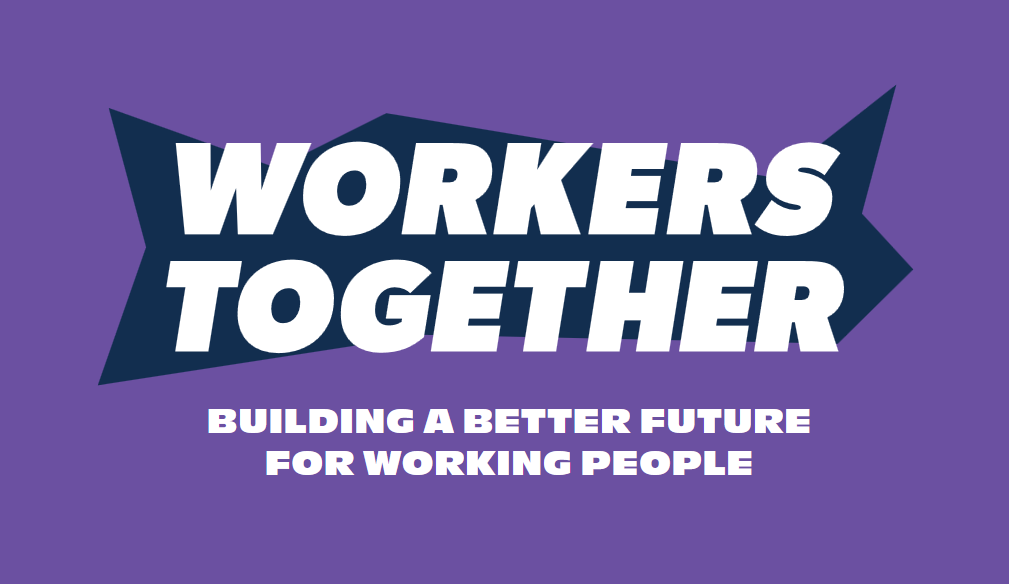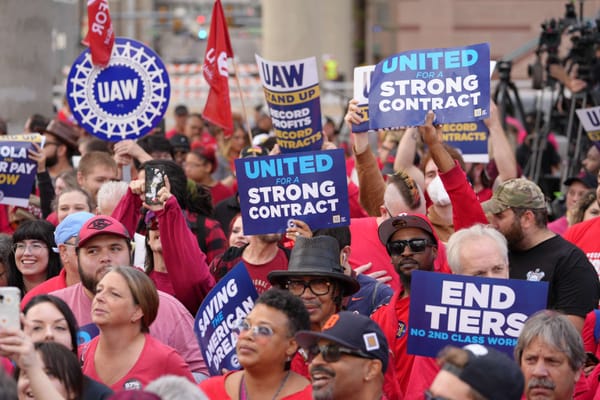Before we turn to this week’s newsletter, I wanted to follow up on two stories recently covered in Class Struggle.
First, as I’m sure many saw, CUPE’s Ontario School Board Council of Unions (OSBCU) reached a last minute tentative agreement with Premier Doug Ford’s government on Sunday evening, averting the strike that was set to begin this past Monday morning. OSBCU president Laura Walton wasn’t overly enthusiastic about the details of the deal, but said putting it to the members to vote was the right thing to do at this stage.
On Tuesday, CUPE National released a public message addressed to all Ontario education workers, recommending that members ratify the proposed contract. While also calling attention to some of the shortcomings of the tentative agreement, CUPE National nevertheless pointed out that the wage offer of $1 per hour across all job classifications, in each year of the contract, is a significant improvement on what the government sought to impose through Bill 28. If ratified, the collective agreement would translate to a 14.4 per cent raise over four years — 16.8 per cent for the lowest paid workers. In addition, the union was able to fight off concessions in the areas of sick leave and job security.
Walton’s disappointment had mostly to do with a lack of movement from the government on funding new educational assistant (EA) positions. The union’s demand for an EA in every classroom, regardless of the number of students, will unfortunately go unfulfilled. However, keep in mind that members still need to vote on this. Ratification vote results are set to be released on December 6. I wouldn’t bet either way on an outcome. Union members seem to be sending bargaining teams back to the table more frequently, and in this case the union president herself was publicly unenthused with the deal. This one could be far from over.
Second, on October 28, I wrote about the struggle of autism support workers at Kerry’s Place in Toronto. These members of SEIU-Healthcare had been through a tough round of bargaining with their employer and voted overwhelmingly to authorize a strike. As of November 21, Kerry’s Place staff are on strike. With many Jamaican- and Nigerian-Canadian staff, the workers have been marching under the slogan of “Black Workers Matter,” calling out the disrespect their employer has shown for the vital work they do and the racism they experience on the job.
You can show your support for Kerry’s Place workers by signing this letter to the employer and the board of directors demanding a fair contract.
Now for today’s story.
On November 21, nearly all workers at a Loblaw distribution warehouse in Calgary received layoff notices amid failed contract talks and an impending employer lockout. The more than 500 employees, members of Teamsters Local 987, have been without a collective agreement since their previous contract expired on June 6. Loblaw’s move to lay-off union members in the midst of contract negotiations with no strike vote taken is a particularly aggressive move from a corporation that has benefited handsomely from inflation and soaring profit margins.
The collective agreement in question covers warehousing staff at Westfair Foods Ltd., a division of Loblaw’s distribution system in Western Canada.
Among other issues, workers have been fighting for a decent wage increase as they, like so many others, struggle with the rising cost-of-living. In their previous collective agreement, full-time staff hired after Nov. 11, 2013, topped out at $23.50 per hour, while those hired before the latter date received between $25.50 and $26.10 per hour, depending on their job classification. In lieu of significant raises, the company had instead provided signing bonuses of up to $2,000 in 2016 — a now widespread employer practice to avoid committing to percentage-based wage increases that accumulate over time.
Yet, according to Teamsters 987, many of its members at Loblaw earn far less than the above wages. Workers with lower seniority or accumulated hours or in part-time employment can make as little as $15.80 per hour — that is, only 80 cents above Alberta’s minimum wage. The Alberta Living Wage Network pegs a living wage in Calgary at $22.40.
Teamsters business agent John Taylor told the Toronto Star, “As [union members] negotiate for higher wages and a better quality of life, they are facing unnecessary layoffs, all while Loblaw profits continue to soar.”
The company, on the other hand, continues to portray its current offer as containing “some of the most competitive wages in the industry,” claiming that under the new terms, high seniority workers would earn more than $33 per hour. Loblaw further holds that “approximately two-thirds” of full-time workers presently make $22 per hour or more.
When it comes to wages, Loblaw needs a reality check. According to Statistics Canada, as of April 2022, the percentage of workers earning less than $20 per hour had declined to just 25 per cent, a reduction of 1.3 million people in two years. Nearly one in four workers now earn $40 per hour or more. Loblaw’s wage offer to its skilled distribution workers is hardly precedent-setting. In fact, Teamsters at other food warehousing employers, such as Sysco Food Service and Federated Co-operative, already make higher wages, according to the union.
The Teamsters, however, have indicated that wages aren’t the primary sticking point. Rather, work-life balance remains the key issue facing workers. According to Taylor from the Teamsters, the company refused all of the union’s non-wage proposals meant to improve working conditions at the distribution centre. In particular, the union is seeking to reinsert language into the collective agreement that the company stripped out six years ago, though the union hasn’t provided specifics concerning this issue.
Loblaw-Westfair Foods retains considerable power over its warehouse workers’ schedules and time-off, with some members of the bargaining unit in Calgary working 10-hour days as a regular schedule. Moreover, many workers in the bargaining unit can be consistently scheduled with no consecutive days off. As I previously covered in a case of Alberta construction workers who were penalized for refusing ‘voluntary’ overtime, excessive working hours are becoming a serious point of contention as employers utilize the ‘labour shortage’ to impose overwork.
Union members have twice rejected Loblaw’s offer, once on November 3 and then again on November 15 in a Labour Board-supervised vote. Rather than come to the table with an offer better reflective of workers’ demands, Loblaw has instead chosen to respond by laying off and locking out its workers. The grocery giant has already put in place contingency plans and moved inventory to other distribution locations to avoid supply disruptions resulting from this work stoppage — a stoppage that the company itself has orchestrated.
With the company’s aggressive approach to a bargaining impasse, the union could be in for trouble in the weeks ahead. Tensions during collective bargaining rounds have begun to show up in the data. For example, the length of work stoppages has nearly doubled since last year, with full-time equivalent days lost to strikes and lockouts up 43 per cent. Loblaw is clearly trying to strike a combative pose.
The company’s actions in Alberta are particularly galling when considered against the backdrop of its pandemic profiteering. As food prices continue to outstrip overall high inflation, grocers in general have reaped windfall profits. But Loblaw has been especially well-positioned to cash in. The grocery giant owns both higher-end and discount food retailers, as well as huge chunks of the food distribution network, while also controlling considerable market share in non-food items, such as clothing and over-the-counter and prescription drug sales. As workers struggle with the cost-of-living, Loblaw has posted large profit gains throughout the fiscal year: profits were up nearly 40 per cent in Q1, climbed by just shy of 20 per cent in Q2, and, as announced last week, grew by 30 per cent in Q3. In the last quarter ending on October 3, Loblaw reported net earnings of $556 million.
CEO Galen Weston’s total compensation in 2021 was a whopping $10,606,389, up from $9,000,078 in 2020, a raise of nearly 18 per cent. If you’re wondering, that works out to $5,099.23 an hour. But apparently $33 an hour is “competitive” enough.
NDP MP Blake Desjarlais (Edmonton-Griesbach) condemned Loblaw’s attack on workers in a statement released on Tuesday: “Loblaws’ profits have increased by more than $1 million per day — yet they’re forcing 500 hard-working Alberta families to worry about how they’ll put food on the table in the coming weeks. New Democrats stand in solidarity with Teamsters Local Union 987. These layoffs are an intimidation tactic, designed to undermine the collective bargaining process.” However, Desjarlais also blamed Prime Minister Justin Trudeau and the Liberals for allowing “big grocery corporations” to make “windfall profits” at the same time that they refuse to pay workers a decent wage.
As it stands, no further bargaining meetings have been set and lay-offs are scheduled to take effect on November 25. Loblaw, one of the largest and most profitable corporations in the country, has geared up to engage in class struggle against its warehousing workers in Calgary a month before the holidays. It’s absolutely shameful.







